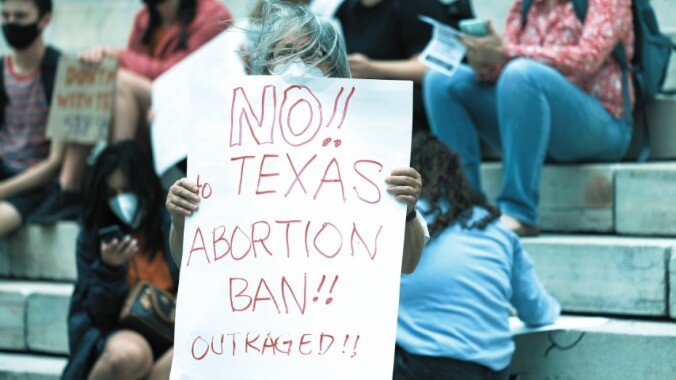Sepsis and Maternal Mortality Rates Surged in Texas After Abortion Ban
Texas is just one state. Maternal health experts are concerned similar, horrific outcomes are happening in all states where abortion is banned.
Photo: Getty Images AbortionPolitics
Well, this is horrifying: In Texas, ever since the state’s civilly enforced six-week abortion ban took effect in September 2021, the rate of sepsis among people who were hospitalized while losing a pregnancy in the second trimester surged by more than 50%., according to a new ProPublica report published Thursday.
Sepsis is a leading cause of death in hospitals across the U.S., and people with nonviable pregnancies face a higher risk of sepsis the longer fetal tissue remains in their uterus. The life-threatening condition can lead to permanent kidney failure, brain damage, dangerous blood clotting, infertility, and death. Texas’ six-week ban was followed by a total abortion ban threatening doctors with life in prison, which took effect after Dobbs v. Jackson Women’s Health in June 2022. The state’s abortion laws offer a narrow exception for threats to the pregnant person’s life, but doctors say it’s unclear when they can actually act—and, given how rapidly a pregnant person’s health can deteriorate amid complications, sometimes, it’s too late.
The outlet also found that, since Texas banned abortion, dozens more pregnant and postpartum people died in hospitals than before the bans. During that same period, the national maternal mortality rate fell by 7.5% from 2019 to 2023—but in Texas, it rose by 33%.
ProPublica obtained a trove of Texas hospital discharge data related to pregnancy from 2017 to 2023, the most recent full year available, and then analyzed this data with the help of over a dozen maternal health researchers and obstetricians. In 2021, 67 patients who lost a pregnancy in the second trimester were diagnosed with sepsis; in 2022, it was 90 patients; and in 2023, that number climbed to 99. ProPublica further referenced a study by the University of Texas Health Science Center in Houston that hasn’t yet been published, which similarly found the rate of sepsis tripled in Texas after abortion was banned.
-

-

-

-

-

-

-

-

-

-

-

-

-

-

-

-

-

-

-

-

-

-

-

-

-

-

-

-

-

-

-

-

-

-

-

-

-

-

-

-








































